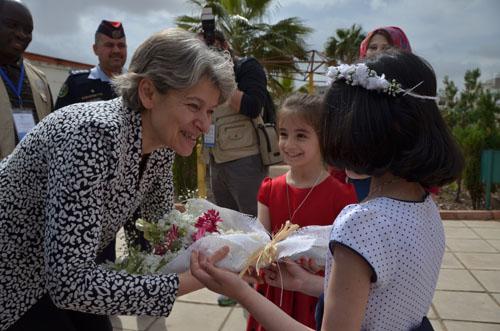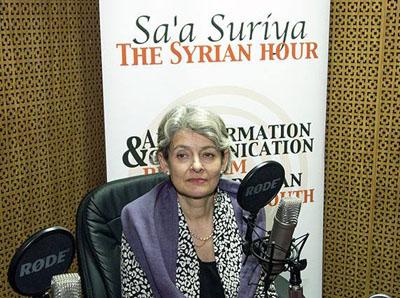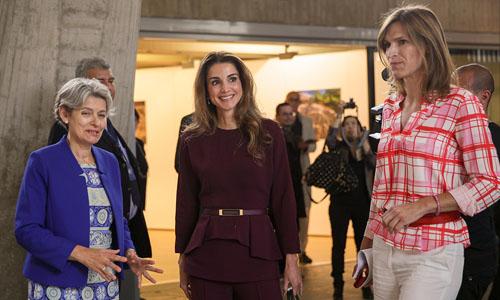You are here
UNESCO initiative to expand education support for Syrian refugees
By Muath Freij - Mar 19,2014 - Last updated at Mar 19,2014

AMMAN — Tackling the problem of Syrian refugees in isolation from the development issues of host countries is not a good strategy, according to UNESCO Director General Irina Bokova.
Speaking at a press conference on Tuesday, Bokova said that platforms and initiatives should be created to involve host communities with young Syrians.
The UN official announced an initiative dubbed “Youth Education for Stability” (YES), targeting Syrians and host countries such as Jordan and Lebanon.
“UNESCO is working on launching this new initiative in order to tackle the issue of secondary and higher education,” she said.
“It will not only be for Syrian refugees, but also for Jordanian and Lebanese youths because we are deeply convinced that tackling the problem of Syrian refugees separate from the development issues of the host country is not a good strategy,” Bokova told reporters.
She noted that UNESCO wants to expand the scope of education support when it comes to refugees.
“We speak only about primary education and about kids out of school. This is important but this is not enough.”
The UN agency is aware that there are thousands of students in secondary schools, she stressed.
“We want to create opportunities also for these students to continue their studies in different universities,” Bokova said. “We don’t want to have a lost generation of Syrians.”
“We know that young people need skills, so we think that we have to have a component of vocational training in some of these cases so that they can find jobs and earn their livings. This is also something that I believe other players here are not doing,” she added.
“It’s not enough in these circumstances to speak only about reading or writing; we want to create certain values.”
In response to a question posed by The Jordan Times on child labour among Syrians, Bokova noted that although UNESCO does not work specifically on this issue, the situation of school dropouts who choose work over education is a matter of grave concern.
“Child labour is once again a consequence of this precise situation and this kind of slip away of the attention of the international community when people think about the refugee situation,” Bokova said.
“I have come to Jordan to see the developments with the Syrian crisis in the country and its impact on development. I wanted to see how one of our projects is working and what kind of impact it has on the educational system,” she added.
The UNESCO official said she was also pleased to launch a radio project which will create a platform to highlight issues of concern to both Syrian and Jordanian youths, commending the generosity of the Jordanian people for accepting refugees.
Bokova launched the “Saa Suriya” (One Syrian Hour) radio show on the Jordanian Hashemite Fund for Human Development’s (JOHUD) Farah Al Nas community radio station after meeting with JOHUD Executive Director Farah Daghistani.
The show is part of a UNESCO project to enhance access to information and freedom of expression for Syrian refugees in Jordan through radio programmes, according to JOHUD.
The project is implemented in partnership with Un Ponte Per NGO and funded by the Japanese government.
Related Articles
Syrian refugees can learn more about the services they are entitled to in Jordan and other issues of interest to them thanks to a radio show launched by UNESCO.
AMMAN — The total contributions of international organisations and donors do not exceed 38 per cent of Syrian refugees’ educational costs, D
Her Majesty Queen Rania on Wednesday met with UNESCO Director-General Irina Bokova to discuss how recent regional developments have affected the progress of education in Jordan and the Arab world.













